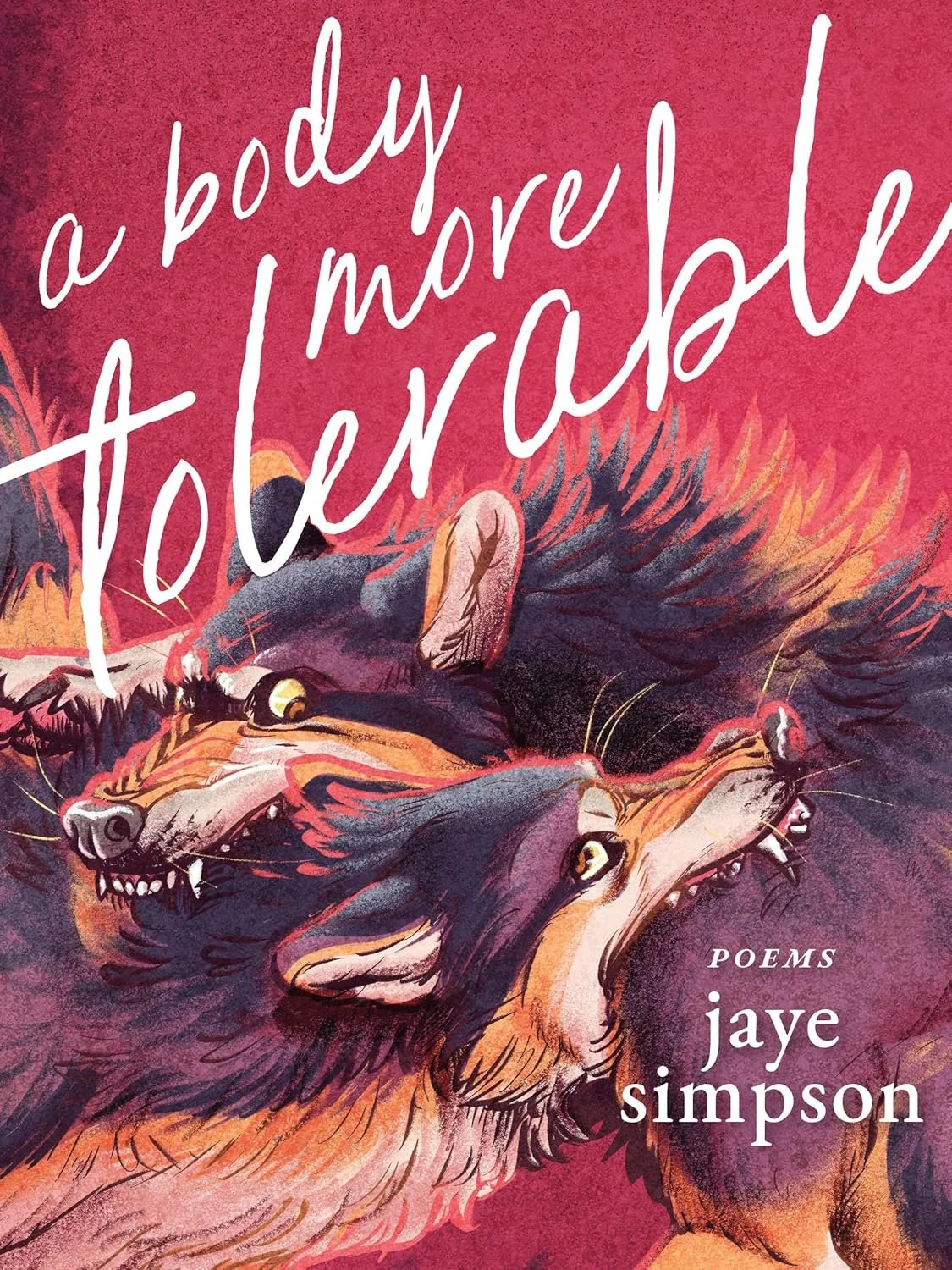Into a Gloaming that is Fertile with Fiery Eyes and Towering Sunflowers: jaye simpson’s a body more tolerable
A Review by margo lapierre
July 9, 2025
a body more tolerable. jaye simpson. Arsenal Pulp Press. $19.95, 88 pp., ISBN: 9781551529677
jaye simpson’s a body more tolerable opens into grief—losses twinned with their mirror images of the possible, the imaginable: “we exist still & you survive / it all in the end.” The collection is divided into three parts, the first of which is titled “Womb // Less,” in which simpson mourns her mother, her own biological motherhood, and the Indigenous children taken by residential school genocide in Canada. A sensory swirl of stolen innocence is encoded into the elegies: orange stuffed animals and children’s shoes on the steps of the Vancouver Art Gallery, “the stone awash.” A hug and the “smell of l’oreal kids / strawberry smoothie shampoo.” By the end of the collection, the tone of mourning will shift to anger, a powerful, rousing feminine rage.
I’m reminded of what it means to write anger well, and simpson is doing exactly that here. Anger isn’t a primary emotion; to translate anger to the page, whether in fiction, nonfiction, or poetry, a writer must show what has caused the wound (the input), rather than focus on the output—the reaction to wrongdoing, to pain. We first encounter simpson’s child-self through her desire to reconnect with her mother, and to be mother, literally and figuratively, though she states “i can’t raise myself / (as much as i so badly want to).” The poem “jules,” a stormy, voice-y, embracing piece in the first section of the collection written for simpson’s mother, was so good that I had to set the whole book down and stare out the window of my train for several minutes, then immediately reread the poem. That child-self will guide the reader through desire and into divinity, into a gloaming that is fertile with fiery eyes and towering sunflowers.
There is a real sense of progression throughout a body more tolerable, both in emotion and in form, as a clarifying darkness eventually disturbs, shatters, and engulfs the poems, the pages turning glitchy then greyscale then black with white text. In the title poem near the end of the book, simpson writes, “I have cracked the edges of childhood: / shattered the assumption of boy / the blunt b, the hollow o, and the blade of y / to become the conduit of myself / which is to demand my flesh have warmth / this breast heavy with my own womanhood.” And indeed these later poems are razor-sharp and assertive, without losing the soft tactile moments of fertile earth, raspberry bushes, soft hands, blushed cheeks, salsa roja, oxidizing flower petals.
One of my favourite stanzas in a body more tolerable, from the poem “return,” will resonate with many women writers: “but i make my living / telling the world of all the hurt i have accrued / never the hurt i could do (oh! what wasted potential).” Ha! And yes! How true that is for those who write of trauma, and particularly women, who risk greater harm if they speak up or retaliate against gendered harm. Throughout this book, there is wit and vulnerability, and narratives that feel like a call to action, to self-love, to sisterhood. Keep an eye out for the excellent revenge poems that acknowledge the violence of being a woman—and further violences of being an Indigenous trans woman—and that fight back within this language of violence. In “i forgave me,” simpson writes, “a child spending their whole life / trying to prove neglectful strangers wrong / is a cruelty I would bestow on none.” Harm, bestowed shame, and unwanted questions become “the same exhaustive prayer.” Gendered and colonial dangers claw at the moments where romance and desire crest: “basic decency is hard to come by / for girls like me—” and “could you count on one hand / the times a first date felt good?” There is retribution in these poems and it is sweet, indeed. Let’s just say that simpson’s garden is well fertilized, her sisterhood hallowed and well tended.
After reading a body more tolerable, I was left with a question on which to ruminate. When to take retributive action or even just delight in my own potential for pettiness? When to forgive? There is space for both in a body more tolerable. simpson doesn’t offer easy answers, but she does create space for those conversations.
I saw jaye simpson read from this collection in Montreal not long ago, and she said something that stuck with me, a statement that, looking back, directs this collection’s trajectory. I’m paraphrasing, but she noted that women must have the courage to be uncouth, non-compliant, unlikable. We can’t all play the same role, either. Some will be the arrowhead, some will be the shaft. This is how we transcend performativity to engage in true activism.
a body more tolerable is bold, tender, and precipitous, gathering speed as it forges into the self-determined future that jaye simpson carves. If you’ve ever felt like you’re not enough, or have turned to the mirror looking for a lost loved one, or have swung from yearning to rage and back again, seek out a body more tolerable.
Photo credit: Curtis Perry
Margo LaPierre is a freelance literary editor and a writer. She’s served on Arc Poetry magazine’s executive and editorial boards since 2019 and holds an MFA in creative writing from UBC. She lives as a settler on unceded Algonquin Anishinaabe land. Her second poetry collection, Ajar, is forthcoming with Guernica Editions in October 2025.


